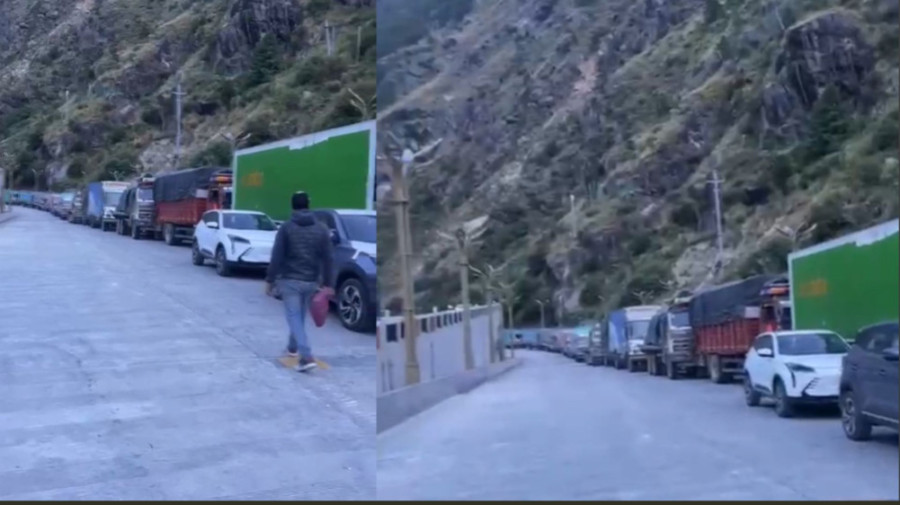National
Delayed cargo containers from Kerung begin entering Nepal
The Chinese officials have set border crossing times between 8:00 am and 11:00 am.
Rishiram Paudyal
After a month-long delay due to landslides, cargo containers stranded in Khasa, Tibet, have started entering Nepal through the Rasuwagadhi border on Tuesday morning.
Floods and landslides had damaged 24-kilometer of road on the Kerung side of the Rasuwagadhi border, leaving cargo destined for the Dashain, Tihar, and Chhath festivals stuck for nearly a month.
Arjun Paudel, Chief District Officer of Rasuwa, reported that both large and small cargo vehicles have now begun entering Nepal. According to a notice from Chinese authorities sent yesterday, only vehicles carrying goods up to 13 tonnes are permitted to travel one-way.
Following the Chinese authorities’ directive, Paudel said loaded containers will enter Nepal from Kerung in the morning and empty ones will return to Kerung in the evening.
Customs official and spokesperson Rabindra Pyakurel said approximately 50 loaded containers and smaller vehicles are expected to enter Nepal from Kerung today.
Thousands of tonnes of commercial goods are still stored in Kerung’s warehouses and in containers, as only a limited number of vehicles carrying loads below the weight limit are allowed to cross.
Ramhari Karki, President of the Nepal-China Himalayan Cross-Border Trade Association, revealed that over 600 containers are waiting in Kerung, noting that fruit containers typically weigh up to 20 tonnes, making the 13-tonne weight limit insufficient.
This delay has led to financial strain, as traders have had investments tied up for an extended period. Transport costs have more than doubled, with the charge for delivering a container to Kathmandu rising from Rs90,000 to Rs200,000.
The Chinese authorities have set border crossing times between 8:00 am and 11:00 am for imports from Kerung and 4:00 pm onwards for exports. The interim period is allocated for road repairs.
Extensive damage to roads has rendered some areas impassable, with parts entirely swept into the Bhotekoshi River. Before Dashain, with assistance from Chinese security personnel, Nepalese citizens had to walk from Kerung to the border due to the impassable roads.
Perishable goods such as apples, mangoes, kiwis, walnuts, and garlic have suffered significant losses due to spoilage during the delay, costing Nepali traders millions.
With the resumed movement of containers, traders hope to reach the market before Chhath, although the opportunity to sell holiday-targeted goods has mostly passed. Many tonnes of apples have spoiled, with some containers now stored in cold storage facilities in Kerung.




 19.12°C Kathmandu
19.12°C Kathmandu















